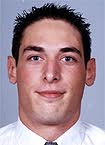
SoCalHoops College News

SoCalHoops College News
USC's Charissis Latest Victim
Of NCAA Amatuerism Rule--(Aug. 18, 2001)
 USC and the NCAA announced yesterday
that USC basketball center Kostas Charissis (6'-11" Jr. C) would have to miss 15
games this season as a result of having played on a foreign club team in Greece which
included professional players. The rule is pretty idiotic, in our humble opinion,
and it takes the concept of "amatuerism" to a new extreme: The college
players in question aren't required to have been paid to play, but simply because they
were on the same teams as pros in their own countries they will be deemed to have violated
the NCAA's amatuerism rule. In Charissis' case, the suspension might not mean much
in the long run for the Trojans, given the fact that the big man has rarely seen the
court, but without Scalabrine this season, both he and incoming freshman Rory O'Neal were
expected to battle for most of the minutes at the center spot, and Rory should see a lot
more action early in the season as a result of the suspension.
USC and the NCAA announced yesterday
that USC basketball center Kostas Charissis (6'-11" Jr. C) would have to miss 15
games this season as a result of having played on a foreign club team in Greece which
included professional players. The rule is pretty idiotic, in our humble opinion,
and it takes the concept of "amatuerism" to a new extreme: The college
players in question aren't required to have been paid to play, but simply because they
were on the same teams as pros in their own countries they will be deemed to have violated
the NCAA's amatuerism rule. In Charissis' case, the suspension might not mean much
in the long run for the Trojans, given the fact that the big man has rarely seen the
court, but without Scalabrine this season, both he and incoming freshman Rory O'Neal were
expected to battle for most of the minutes at the center spot, and Rory should see a lot
more action early in the season as a result of the suspension.
USC issued a press release yesterday about the suspension. Here it is:
Charissis To Miss First 15 Games Of 2002
Reserve center averaged 1.2 points, 1.2 rebounds lastseason.
Aug. 17, 2001
USC men's basketball junior center Kostas Charissis, a Greek native who has been a reserve the past two years, will have to sit out the Trojans' first 15 regular-season games this coming 2002 season for a violation of NCAA amateurism rules.Before he attended USC, Charissis played on a club team in Greece which included professional players. Even though he played as an amateur, this is an NCAA violation.
The NCAA made a major effort this summer to check the playing history of foreign men's basketball players, looking for violations of the amateurism rule.
The 6-foot-11, 250-pound Charissis averaged 1.2 points, 1.2 rebounds and 4.7 minutes per game in 18 appearances as a sophomore in 2001 as the Trojans finished 24-10 and reached the NCAA Tournament's Elite Eight. As a freshman in 2000, he played in 26 games, averaging 1.5 points, 2.1 rebounds and 9.8 minutes per game, starting 13 times in place of injured regulars.
If you're curious about the NCAA's application of the amatuerism rule to foreign students, much of it has to do with how the "club" system works in Europe. Most youth and "club" teams are sponsored by professional teams, and they receive assistance from the pros (or from a professional sponsor) in the form of subsidies, gear, practice and game facilities, travel, etc. Most of the amatuer players are not paid, but they often play with pro players during the off-season, and many of the club teams serve as "feeder" teams for professional teams. In Europe, this is the norm. Here, it makes you an outcast with the NCAA, even if the player in question has never played for money or done anything else which would cause one to question his amatuer status. The NCAA's official stance on the subject is that an amatuer "youth" or "club" eam is considered a professional team (and hence the players are also considered professionals) if the team serves as a "feeder team" for the pro organization, or if the team is controlled, owned or operated to any extent by a professional sports team or organization. This is from the Minutes of the NCAA Division I Academics/Eligibility/Compliance Cabinet Subcommittee on Legislative Review/Interpretations" meeting from September 6, and this is a how the NCAA interprets the amatuer-pro mix:
"Youth Team Sponsored by a Professional Team. (I) An athletics youth team is considered a professional team if the team serves as a "feeder team" for a professional sports team or organization, or if the team is controlled, owned or operated to any extent by a professional sports team or organization. An athletics youth team is not considered a professional team if it receives sponsorship monies from, but operates independently of, a professional sports team or organization, provided the conditions of Bylaw 12.6.1.8 are satisfied. [References: Bylaws 12.02.4 (professional athletics team) and 12.6.1.8 (youth teams)].
Strange indeed. A player doesn't have to be a pro, doesn't have to get paid, can be an amatuer in every respect, take no money (as Charissis told the LA Times he hadn't), and yet because of the people he plays with, be considered a pro and be required to forfeit eligibility or sit for 15 games in a season. We say, it's time for the NCAA to change the rule
![]()
©Copyright SoCal
Hoops 1997-2001
All rights reserved
E-mail: jegesq@socalhoops.com
![]()